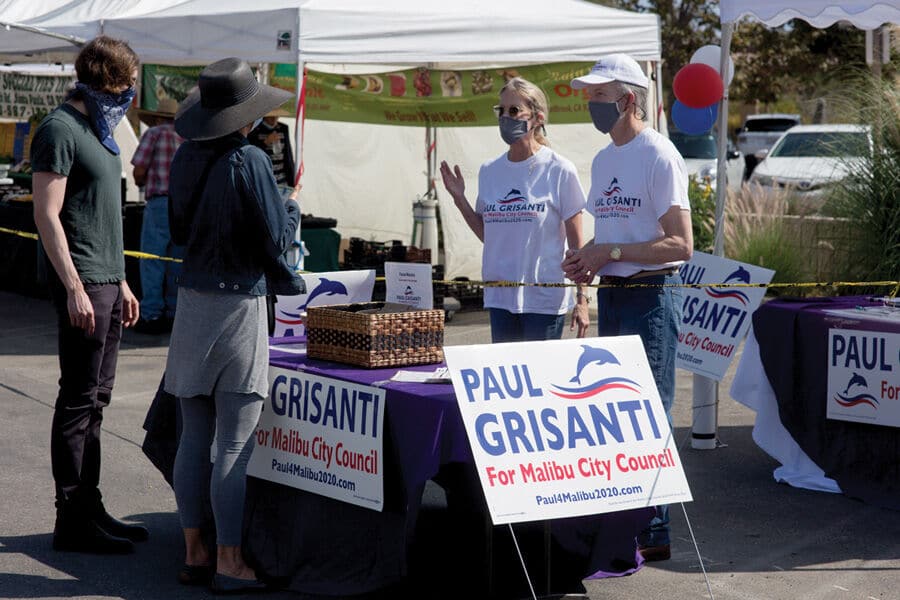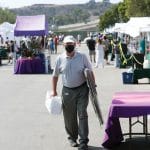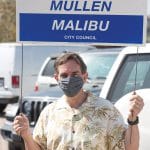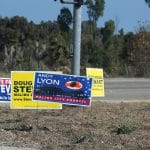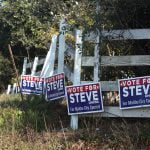PCH is papered with signs. Local social media pages are alight with endorsements and ads. Maybe you even gave a few dollars to help out your favorite candidate. But did you shake his hand?
This year, all eight candidates running for three city council spots are largely campaigning from home. All robbed of face-to-face time by the pandemic, each is executing his own campaign strategy.
“Conceptually, you have to figure out how to get your message out in an effective manner to as many people as you can,” candidate Rick Mullen told The Malibu Times. “I will let you know at the end of this election if I was successful,” he laughed.
Mullen is the only candidate running for re-election. Last election cycle, he campaigned on a slate dubbed “Team Malibu,” which put out slick videos and made an intense door-to-door effort to get out the vote. Mullen’s campaign strategy this time relies more on his record, which includes everything from supporting declaring surfing Malibu’s official sport to more substantive efforts such as the city’s purchase of 29 acres of land.
Lance Simmens has spent his career working in politics. Though he’d stumped for multiple presidents, Simmens said he still was due for “a real education” when he first ran for city council in the small town of Malibu two years ago.
“The most effective thing to do was have parties and meet-and-greets,” Simmens said, describing the process of creating “an effective network of local people” in 2018.
Mark Wetton, who is running for council for the first time this year but helped out with current mayor Mikke Pierson’s campaign in 2018, agreed that campaigning is much easier in person—and fundraising is, too. “In person … you can make an announcement, have all these people in the same room. There’s a little bit of peer pressure for people to donate.”
Candidate Andy Lyon is the only person running who has not fundraised for his campaign.
“I just don’t think it’s for me to raise a bunch of money to get a job to be a servant to Malibu,” he said. “Bringing in all this money just feels like you’re buying a position.”
While multiple candidates The Malibu Times spoke to for this article commended Lyon’s actions, every other one has fundraised at least a little bit, though the city caps individual donations at $250. Lyon described his own campaign as “grassroots” and said that he’s leveraged his already-sizable social media following.
“I don’t think there are any ethical issues with raising money unless somebody is enough of a lowlife that they would sell their vote for 250 bucks,” candidate Paul Grisanti said.
Grisanti is running a more old-school campaign. He told The Malibu Times that he has spent lots of time on the phone with constituents, like he did when he ran 30 years ago, as well as taking out ads in The Malibu Times.
He has also attended the several Zoom forums put on by organizations such as the Malibu Democratic Club where local issues are discussed, as have all other candidates. Though some forums can run up to two hours and seem to have relatively low turnout, candidate Doug Stewart said they have “probably been more productive than I expected because … you’re talking to a group that has focused interest. “While we’re not in their living room, we’re in their Zoom room,” Stewart said.
One notable exception that allowed candidates to get some face-to-face time (or rather, mask-to-mask time) was the Malibu Farmers Market last weekend, where three candidates met potential voters from the safety of socially-distanced booths. Grisanti, Mullen and another candidate, Steve Uhring, attended the event; just over half the candidates in the race declined to go.
Uhring told The Malibu Times that he went because he thinks supporting the farmers market is a good thing to do, especially when much of his campaign revolves around trying to maintain Malibu’s rural character. It was also a chance to talk to people and gather perspectives. Of the potential risks, Uhring said that part of his current role on the planning commission involves doing site visits, so he understands how to social distance effectively.
The other five in the running chose not to attend. Bruce Lee Silverstein has been outspoken about the fact that he is campaigning completely from home.
“Social distancing and wearing a mask reduces the risk of transmission of COVID-19,” Silverstein said. “It does not eliminate the risk … A first responder goes to work and they do their best to social distance, but they’re providing an essential service. Trying to get someone to vote for me for city council is not an essential service.”
One silver lining is relying on social networks already in place.
“I have a lot more friends in Malibu than I ever dreamed of,” Silverstein quipped.
Uhring, too, has been feeling the warmth, partly due to one unique campaign strategy: bright red, slogan-emblazoned vests for dogs. His pitbull has modeled one on Uhring’s social media; some of his friends’ dogs have worn the vests while walking on Zuma Beach. “It gets people’s attention and gets my name out there,” Uhring said. “I have people stop me on the street—probably more for the dog than for me—but we talk and get to know each other.”
Grisanti applauded Uhring’s dog vests as “clever and sweet.”
“People love their dogs,” said Grisanti. Unfortunately, “I don’t have a dog and my koi fish aren’t wearing little vests, although I’ve talked to them about it,” he joked.

